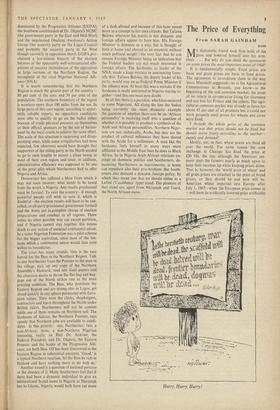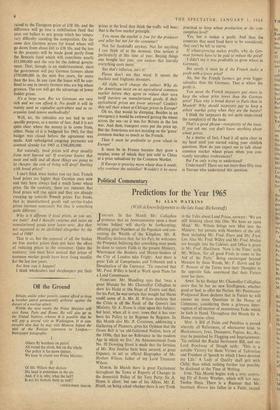The Price of Everything
From SARAH GAINHAM
DONN
My diplomatic friend took firm hold of his glass and lowered himself into his arm- chair. . . . But why do you think the agreement on grain prices the most important event of 1964?
It is fundamentally simple. Food prices are basic and grain prices are basic to food prices. The agreement to co-ordinate them in the way Sicco Mansholt suggested—he is the Agricultural Commissioner at Brussels, you know—is the beginning of the real common market; the point of no return in co-operative living for Germany and not less for France and the others. The agri- cultural common market was already in force for about 85 per cent of all products but it could not work properly until prices for wheats and corns were fixed.
I thought the whole point of the common market was that prices should not be fixed but should move freely according to the market— supply and demand?
Ideally, yes; in fact, wheat prices are fixed all over the world. For some reason • the corn exchange at Chicago has fixed the price at £20 10s. the ton, although the American tax- payer pays the farmers nearly as much again to' keep their incomes up while keeping prices down. That is, however, the 'world price of wheat' and all grain prices are attached to the price of bread grains, or they should be and now will be. American wheat imported into Europe after July 1, I967—when the European price comes in —will have its artificially lowered price artificially.
Hurry, Hurry, Hurry! raised to •the European price of £38 10s. and the difference will go into a stabilisation fund that pays out ballast to any group which has tempo- rary difficulty standing the competition. On the same date German prices for bread wheat will go down from about £43 to £38 10s. and the loss to the peasants will be made good partly from the Brussels fund which will contribute nearly £11,000,000. and the rest by the federal govern- ment. That, though, is an understatement, since the government will pay German farmers about £730,000,000 in the next five years, far more than the loss. In any case the losses will be con- fined to one in twenty farmers who are big wheat growers. The rest will get the advantage of lower fodder prices.
Its a large sum. But we Germans are very rich and we can afford it. No doubt it will be mainly used to capitalise agriculture and to re- organise land tenure methodically?
Well, no, the subsidies are not tied to any specific purpose, as a matter of fact. And it is not quite clear where the money is to come from, either. None of it is budgeted for 1965, for that budget was closed before the agreement was made. And unbudgeted outgoing payments are assessed already for 1965 at £306,000,000.
But naturally, food prices will drop steadily front next harvest on? If everyone knows that meat and milk and all those things are going to be cheaper, the cost of living will drop? Starting with bread prices?
I can't think what makes you say that. French food prices are higher than German ones now and they have always had a much lower wheat price. On the contrary, there are rumours that food prices will rise again and they are already creeping up towards French prices. For foods, that is; manufactured goods and service-trades prices increase constantly but that is something quite different.
Why is it different if food prices, as you say, are basic? And I thought customs and taxes on manufactured goods were lower now. Are they not supposed to be abolished altogether by the end of 1966?
That is so, but the removal of all the brakes on free market prices does not have the effect of reducing prices to the consumer. Quite the contrary; you must have noticed that prices of common market goods have been rising steadily for the last few years.
But how can it happen?
I think wholesalers and shopkeepers put their prices at the level they think the traffic will bear; that is the free market principle.
You mean the market is free for the producer and seller but not for the consumer?
Not for foodstuffs anyway. Not for anything I can think of at the moment. One notices it particularly at this time of year. Buying things one bought last year, one notices that literally everything costs more.
But that's inflation, isn't it?
'Please don't use that word. It upsets the markets and frightens investors.
All right, we'll change the subject. Why do the Americans insist on an agricultural common market before they agree to reduce their own tariff barriers on manufactured goods, if their agricultural prices are lower anyway? Couldn't they sell their wheat at Chicago prices in Europe' Oh no, that would be dumping. Besides in an emergency it would be awkward getting the wheat across the sea—as it was for Britain in the last war. And then, transport costs put the price up. But the Americans are not insisting on the 'green' common market so much as the French.
Then it must be profitable to grow wheat in Europe?
It must be in France because they grow a surplus, some of which they just sold to China at a price subsidised by the Common Market.
If Europe is growing more wheat than it needs, why continue the subsidies? Wouldn't it be more practical to keep wheat production at the con- sumption level?
Yes, but it makes a profit. And then the countries that need food have to be considered; they can't be left to starve.
If wheat-growing makes profits, why do Ger- man farmers have to be paid to reduce the price?
• I didn't say it was profitable to grow wheat in Germany.
But surely it must be if the French make a profit with a lower price?
Ah, but the French farmers get ,even bigger subsidies than the Germans. That-is where the profit is.
You mean the French taxpayers pay more to keep the wheat price lower than the German price? Then why is bread dearer in Paris than in Munich? Why should taxpayers pay to keep a sellers' market going when they are the buyers?
I think the taxpayers do not quite understand the complexity of the issue.
That's a good phrase—complexity of the issue. If you ask me, you don't know anything about wheat prices.
As a matter of fact, I had it all quite clear in my head until you started asking your childish questions. How do you expect me to talk about common market wheat prices when you con- stantly introduce irrelevancies?
But I'm only trying to understand!
Understand? There are not more than fifty men in Europe who understand this question.































 Previous page
Previous page